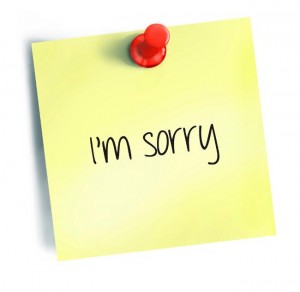Apologies are often difficult. For me, pride is the issue. I like being right, I don’t like calling attention to my flaws (though there are many), and I would prefer to win rather than lose.
While my pride still rears its ugly head occasionally, I learned long ago that refusing to admit my mistakes and failing to apologize does damage to important relationships in my life. The sooner a child understands the significance of humility, the easier relationships will be. Apologies Really Do Matter.
With children, a report of an offense is often followed by, “But it wasn’t my fault!” or “It was an accident!” or “But he/she…!” While mediating often requires more time than we would prefer, children need adults who are willing to facilitate empathy and compassion (the foundations of a genuine apology).
When all parties involved are calm and ready to discuss the problem, allow each child to explain what happened from his perspective. Do not allow the other child to interrupt. Ultimately, don’t we all want the same opportunity in the midst of a conflict?
One of my most important jobs as the adult in the situation is to help the child/children understand that 1) everyone makes mistakes and 2) others feelings and physical well-being are just as important as one’s own.
After each child has had an opportunity to share their thoughts, I have a conversation with 1 or both (depending on the situation) and help the child/children think through the situation by asking questions that might sound something like: Tell me how friends act with one another. How were your actions friendly? How were they unfriendly? Would you want to be friends with someone who … to you? How do you think he felt when you …? What could you have said/done differently? What do you think he/she thinks about you now? What do you think he/she might be worried about now? How can you make this situation better?
Whether the “hurt” is intentional or not, an apology needs to be given. An apology is recognition that 1) someone was hurt and 2) one’s words or actions played a part in the offense. An apology is an expression of one’s desire to move on and rebuild the relationship. Apologizing communicates that 1) you know the rules, 2) you’re not proud of what you did and 3) you will try hard in the future not to do the same thing.
The ideas of both needing and extending grace take time and patient guidance from a caring adult who’s 1) willing to invest in the lives of their children by facilitating conflicts and 2) willing to apologize themselves when need be.
We can’t expect our children to do as we say when they see us do the opposite. Some of my most powerful lessons have been times when I’ve humbled myself and apologized to my children. What a better way to reinforce that 1) everyone (including adults) makes mistakes and 2) regardless of age or station in life, others feelings and physical well-being are equally important.
Any recommendations for helping children become quick to apologize when they’ve hurt someone? Join the conversation using the reply button at the top of this post.
Before you leave the site, follow my blog (top, right of this post). It’s quick and easy 🙂
For more from Marea, check out Me and Thee Studios’ faith based leveled readers for 1st-2nd graders at http://www.meandtheestudios.com/early-reader-collection.html.

